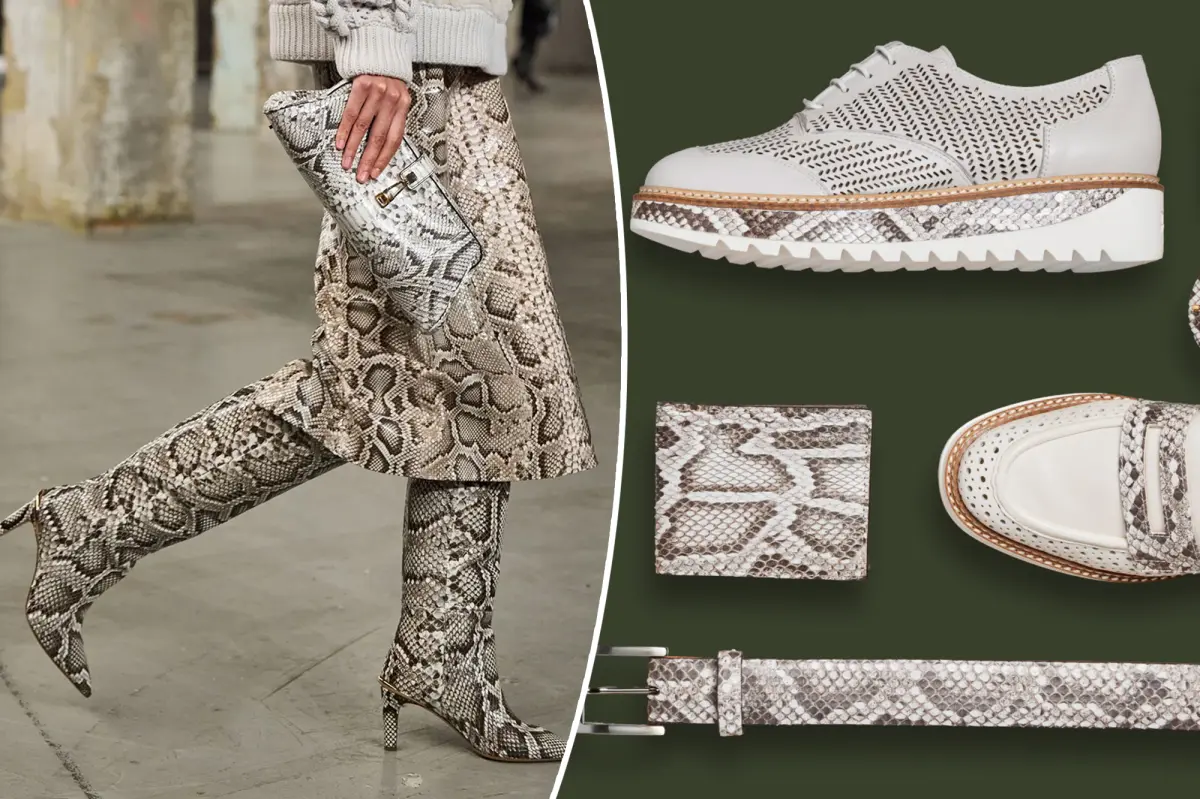Shopping will now save the planet.
Florida Governor Ron DeSantis announced this week that the state is taking an uncharacteristically classy approach to tackling one of its most notorious ecological threats — the invasive Burmese python — by literally turning the problem into luxury fashion.
The Sunshine State is renewing its efforts to remove the apex predators from the Everglades, because they are known to devastate native wildlife populations and transform them into stylish fashion accessories through a new partnership between the Florida Fish and Wildlife Conservation Commission (FWC) and Miami-based textiles manufacturer, Inversa.
This week, Florida Governor Ron DeSantis gave updates on the state government’s partnership with Miami-based textiles manufacturer Inversa. CRYSTAL VANDER WEIT/TCPALM / USA TODAY NETWORK via Imagn Images
In an era when fashion powerhouses like Chanel and Burberry are banning exotic leathers amid animal welfare concerns, Inversa‘s model is part of a paradigm shift.
Instead of relying on farming or illegal hunting, the company turns destructive invasive species into what CEO of Inversa Aarav Chavda calls “ethical exotics.”
Burmese pythons were first introduced to Florida in the 1970s through the illegal pet trade, and once they were released into the wild, they quickly established breeding populations in the Everglades. And that’s where they became a hated predator.
“These things will take out a deer,” DeSantis said, according to WESH. “It’s unbelievable what they’re able to do. A single python can threaten the survival of many endangered species.”
For some time, Florida python skin has been transformed into luxury products, in an effort to save the Everglades, like the Damascus Cuff with Python Inlay that retails for $1,095, for brands like Chris Ploof and Rex Shoes.
However, the state’s partnership with Inversa is a big deal.
The company started working with the Sunshine State back in 2024 — and they’ve done incredible work ever since. Between May and July 2025, 1,022 pythons were removed — nearly triple the number caught during the same period in 2024.
“The new program accomplished more removals in July 2025 alone than in the entire year before,” DeSantis said in a statement.
The company is doing great things for Florida’s Everglades. CRYSTAL VANDER WEIT/TCPALM / USA TODAY NETWORK via Imagn Images
Inversa, which was started in 2020, doesn’t just process the python hides — the company also contracts roughly 50 professional python hunters who previously worked under the Florida Fish and Wildlife Conservation Commission (FWC), effectively creating its own fleet of field specialists.
According to the company, each python hide helps protect up to 460 native animals that a single 13-foot python would otherwise consume in its lifetime, while improving the survival chances of 39 endangered species.
“Inversa’s priority with this public-private partnership is to remove as many pythons as possible while defraying the taxpayer’s burden, who, without the help of the fashion industry, would front 100% of the cost of removals and management,” Henri Ferré, Inversa’s head of development, told The Post.
Inversa now contracts roughly 50 professional Python hunters who previously worked under the Florida Fish and Wildlife Conservation Commission (FWC), effectively creating its own fleet of field specialists, and then sells the materials to designers. Inverse Leathers
It’s a win-win for both the state of Florida and people’s closets.
Inversa’s Florida python garments have already hit the runway, with models in the Gabriela Hearst and KHAITE 2025 fall shows slithering down the catwalk in python jackets, handbags and more.
Hearst — who’s known for her sustainable and ethically produced designs — was one of the first brands to bring Inversa to the runway, calling the company a “game-changer” in an interview with Vogue last fall.
Inversa’s python garments have already hit the runway, with models in the Gabriela Hearst 2025 fall show slithering down the catwalk in python jackets, handbags and more. Inverse Leathers
The state’s partnership with Inversa has not only boosted removal numbers and enhanced people’s wardrobes, but it’s also reduced the FWC’s administrative workload by 89% and increased python hunters’ pay by about 60%, according to the governor’s office.
Inversa‘s model is part of a paradigm shift. w.kleinberg
Ferré noted that “increasing hunter pay by leveraging the fashion sector has led to a significant increase in removals” and shared that Inversa has found that fashion brands are seeking out these types of materials to meet their sustainability goals.
FWC Chairman Rodney Barreto said, “Our partnership with Inversa and the Python Action Team Removing Invasive Constrictors (PATRIC) program highlights the milestones we’ve achieved against the invasive Burmese Python, which will benefit generations to come.”
“It’s been a pleasant surprise to see the progress,” DeSantis said, adding, “I will tell you some of the stuff is very fashionable.”

